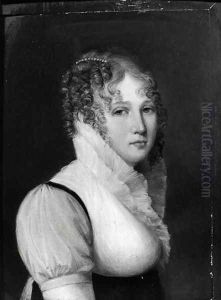Delphine de, Marquise de Custine Sabran Paintings
Delphine de Sabran, Marquise de Custine, born on March 18, 1770, was a French noblewoman known for her literary salon and for being a figure in the romantic literary movement in France. Born into an aristocratic family, Delphine was the daughter of the Marquis de Sabran and his wife, Delphine de Custine. Despite her privileged upbringing, Delphine's life was touched by the tumultuous events of the French Revolution and the subsequent political upheavals of her time.
The Marquise de Custine's personal life was marked by tragedies and controversies. In 1790, she married Astolphe de Custine, an aristocrat who shared her literary interests. However, the marriage was unhappy, and the couple eventually separated. Delphine's husband was later executed during the Reign of Terror, leaving her a widow with a young son, Astolphe-Louis-Léonor, who would later become a notable writer himself.
After the death of her husband, Delphine de Custine focused on her literary pursuits and established a salon that became a center of intellectual and cultural life in Paris. She was known for her wit, her erudition, and her ability to cultivate relationships with leading figures of the time, including François-René de Chateaubriand, a key figure in the French Romantic movement. Through her salon, Delphine played a significant role in shaping the literary tastes of the era.
Despite her achievements, Delphine de Custine faced challenges as a woman in a male-dominated society, and her reputation was sometimes the subject of gossip and slander. Nevertheless, she maintained her independence and her commitment to the world of letters throughout her life.
Delphine de Sabran, Marquise de Custine, died on July 13, 1826. While she did not leave a substantial body of literary work of her own, her influence on French literature and her role as a patron of the arts were significant. Her salon is remembered as a vibrant hub of Romantic intellectual and artistic activity.
